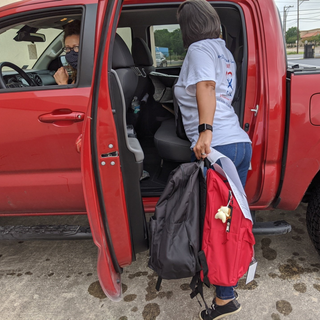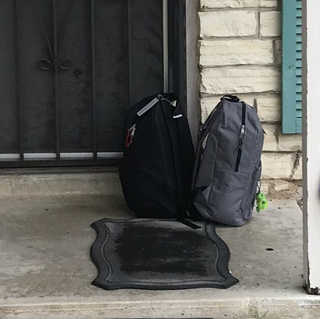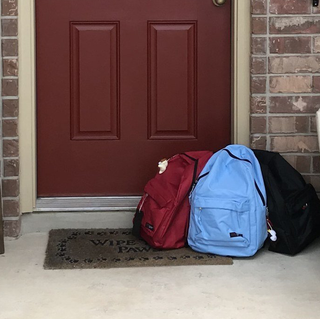Story of Hope: Lisa
May Advocate Impact Story
Written By: Lisa's Advocate Supervisor
This is a story of how just one person can make a huge impact on a family even during the Covid-19 crisis. CASA advocate, Lisa Fernandez-Poirier, was sworn in as a new CASA advocate at the end of September 2018. She immediately selected a complicated case with five children in two different placements. The children had been removed from their home due to allegations of physical abuse as well as domestic violence in the home.
Lisa has been a constant for these kids since October 2018, but in this story I wanted to highlight the amazing work that she has been doing now, and how she has been able to continue advocating for the children and their needs, even though her advocacy looks a bit different now.
She quickly realized that the boys did not have the computers that they needed to do their school work.
The two oldest boys have been placed with their great-grandmother since they were removed. Lisa has done a great job meeting their basic needs, however distance learning has been a challenge. She quickly realized that the boys did not have the computers that they needed to do their school work. She contacted the school and found out that all the computers had already been given out. She was assured that more computers had been ordered and as soon as they were in they would email the great-grandmother and let her know.
Lisa soon realized that there was a communication barrier between the school and the great-grandmother as she did not use email, and definitely did not have the Class Dojo app needed for lessons. Lisa was able to work out a better communication system for the great-grandmother. The school and the boys now have their computers, and are able to complete their assignments. The computers also allow them to attend their visits virtually. Lisa has also been able to ensure that they understand their lessons, and that they are able to continue to make academic progress.
Visitation was also an immediate concern as the great-grandmother was considered “high risk” and she was worried about having to leave the home to take the boys to visits. The foster parents also expressed similar concerns noting that one of the children in their home was also high risk for COVID-19. Lisa contacted the CPS worker and the children’s attorney, and ultimately it was acknowledged that virtual visits would be in the children’s best interest at this time. Lisa has been able to continue to observe parent/child visits virtually at this time. She continues to document her concerns during virtual visits and reports it back to all parties. She is also visiting the kids through Zoom and ensuring that they are doing well with their school work. She has also been able to confirm that therapeutic services will start virtually as well.
Lisa was also able to submit a request form to CASA to pick up some much needed items for her CASA kids and do a porch drop off. The children were so happy to know that CASA is still advocating for them and looking out for their best interest even now. The kids send her a sweet video expressing their gratitude.
This case is still far from over, there is now a criminal case pending due to the physical abuse as well as new child abuse allegations that have been made and are currently being investigated. Trial is set to continue this summer and Lisa will be there ready to testify on what she thinks is in the children’s best interest. Lisa has been there for these kids for 18 months now. She has seen the kids grow and thrive and she has also seen them struggle with the complicated feelings that come from being in the system. Lisa has been with them every step of the way ensuring that they will not fall through the cracks and that they will soon have permanency.
Help us provide more Advocates like Lisa who are willing to go above and beyond even in the midst of crisis to provide a voice for children in foster care.
Fund Their Hope
In November 2025, Child Protective Services received a referral involving two sisters, ages 13 and 14, who were found caring for themselves. Following the death of their father, the girls experienced ongoing abuse and neglect. They were living in unsafe and unsanitary conditions, frequently left alone without adequate food, functioning plumbing, or consistent supervision, and were exposed to strangers regularly coming in and out of the home. Shortly after removal, Tameka Woolfolk was appointed as the Advocate on the case. From the very beginning, Tameka became one of the few consistent and reliable adults in the girls’ lives. The children experienced and continue to endure placement changes. These frequent transitions created ongoing instability and further complicated the girls’ ability to heal and adjust. Throughout each move, Tameka remained steadily involved, working diligently to ensure that the children’s services and support continued without interruption. She supports the girls not only emotionally, but physically as well helping pack their belongings at each move, accompanying them during school tours, and remaining readily available whenever they need support. Neither child was initially aware that they had the right to speak directly with the judge. Tameka recognized the importance of their voices being heard and with the support of the Ad Litem, helped to facilitate their presence at court, requesting that the judge meet with the girls in a breakout room, so they could personally express their wishes, all with the department, CASA and the Ad Litem by their side. In addition, this case was referred to Collaborative Family Engagement (CFE). During CASA’s ongoing exploration for family connections alongside the Department, Tameka discovered the children’s father’s obituary. Through this discovery, it was learned that the girls’ father had served in the United States Army as a combat medic during the Vietnam War and later worked for 30 years in civil service. Tameka took the initiative to request documentation, including VA records and a death certificate, to determine whether the children might be eligible for survivor benefits. The obituary also revealed that the girls are two of fourteen siblings. While many of the siblings were unable to provide support, CASA and the Department were able to establish contact with one brother. Through Tameka’s strong collaborative relationship with the Department and the Attorney Ad Litem, a thoughtful and appropriate plan was developed to allow the girls to begin visits with their brother, his wife, and their cousins. Although this story is still unfolding, both girls know one unwavering belief, that no matter what comes next, they know that Miss Tameka will continue to stand beside them every step of the way.










